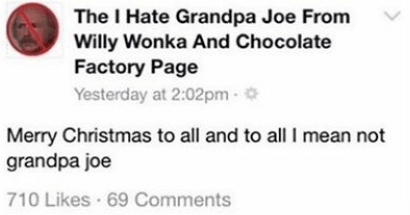I have a really unpopular opinion, in that I prefer the 2005 Charlie And The Chocolate Factory movie over the original version. A lot of people are shocked to hear that, since the original is such a classic. But that’s not to say I hate the original. There are things in it that I do like. The special effects are good for the time, Gene Wilder does a good Willy Wonka, and the kids are (mostly) well portrayed. Since the movie is a musical, it is kind of weird that they didn’t use any of the songs from the book, but on their own merits, the songs are catchy and memorable.
But, even with all that said, the original movie has one huge, glaring flaw that prevents me from calling it a “classic” like everyone else does. And that flaw is that Charlie breaks a rule.
I’m sure you all know how the story goes: five kids find golden tickets hidden in random candy bars from Willy Wonka’s chocolate factory, which grant them access to a day tour of the factory. Along the way, they run into a lot of situations where Mr. Wonka tells the kids not to do something, but they do it anyway, with disastrous results. Every time this happens, the kid gets sent away to be fixed. Or…as fixed as they can be. Eventually, Charlie is the only one left. Mr. Wonka tells Charlie the real reason for the golden tickets: he wanted to find someone new to run his chocolate factory, and out of the five kids who found the golden tickets, Charlie proved himself to be the most worthy. The other kids were, quite frankly, absolute brats who did not deserve the grand prize of owning Willy Wonka’s business.
At least, that’s how it goes in the book. In the 1971 movie, Charlie breaks a rule. Mr. Wonka tells him and Grandpa Joe not to drink the Fizzy Lifting Drinks, but they do it anyway and almost die. In other words, Charlie broke a rule. Charlie. Broke. A. Rule.
What. The. Blazes?
Why, just why? Why did they make Charlie break a rule? The whole point of the book was that Charlie was the only good kid out of the whole bunch. Augustus Gloop was a greedy little kid destined to die from obesity, Violet Beauregard was full of herself, Mike Teevee was on course to be that loser who still dwells in their parents’ basement playing video games when they’re 35, and Veruca Salt…ugh. I wish I could just punch that little brat. But Charlie was none of those things. He was a nice, sweet little boy who cared for his family and always followed the rules. But if he goes against the rules Mr. Wonka established, then how is he any better than the others?
The ending of the movie really exemplifies this issue. By process of elimination, Charlie is the only kid left, so he asks Mr. Wonka if he’s won the grand prize. But Mr. Wonka says no, because of the floating drink incident. He sends Charlie and Grandpa Joe away, saying that they’ve lost like the others did. But then Charlie comes up and gives Mr. Wonka the Everlasting Gobstopper that he’d pocketed earlier to take back to “Slugworth.” To which Mr. Wonka says that “Slugworth” was actually one of his employees, and the Gobstopper thing was a morality test.
Um…what? That just makes things even more complicated and confusing. Wonka wanted to see if the kids were worthy to run his factory, okay. But wouldn’t he be able to judge that based on what he observed of them during their factory tour? Like I said, we saw how four out of those five kids were horrible people who ended up breaking rules. No one in their right mind would deem them worthy of running a company.
Now, you could raise the point that Mr. Wonka didn’t know how “good” or “bad” the kids who found the golden tickets would be. For all he knew, every kid who came to his factory would be like Charlie. But what if more than one kid passed the Gobstopper morality test? Uhhhhh.
And from a screenwriting perspective, this just makes no sense. You want to butcher Charlie’s character from the book by making him stoop down to the same level as the other kids by breaking a rule, when the whole point of the book was that Charlie didn’t break any rules, and therefore was worthy to inherit the Wonka business. But if you’re gonna add an extra subplot where Charlie is worthy after all, then what was the point of all that? It’s just…ugh. Roald Dahl, the author of the book, said that he hated the movie, and frankly, I don’t blame him.
This is where I think the 2005 movie greatly succeeds. This movie is much more faithful to the book, in that it portrays Charlie as the very definition of “nice kid.” He shows an undying love for his family, he never breaks any rules, and honestly, I wouldn’t be surprised if this kid grew up to be President. That’s not to say that the 2005 movie is without its flaws. My big gripe with it is, ironically, the ending. Not that it’s “bad.” It is nice to see Willy Wonka reconcile with his father, and for him to reach a compromise with Charlie where his family does get to live with him in the chocolate factory. But, again, it wasn’t in the book. It really feels like the screenwriters just decided to do whatever popped into their heads when writing the ending. But, like I said, the 2005 movie succeeds where the original failed. And that is the reason why I prefer it over the original.
“The earth says hello!”
(I couldn’t resist.  )
)


